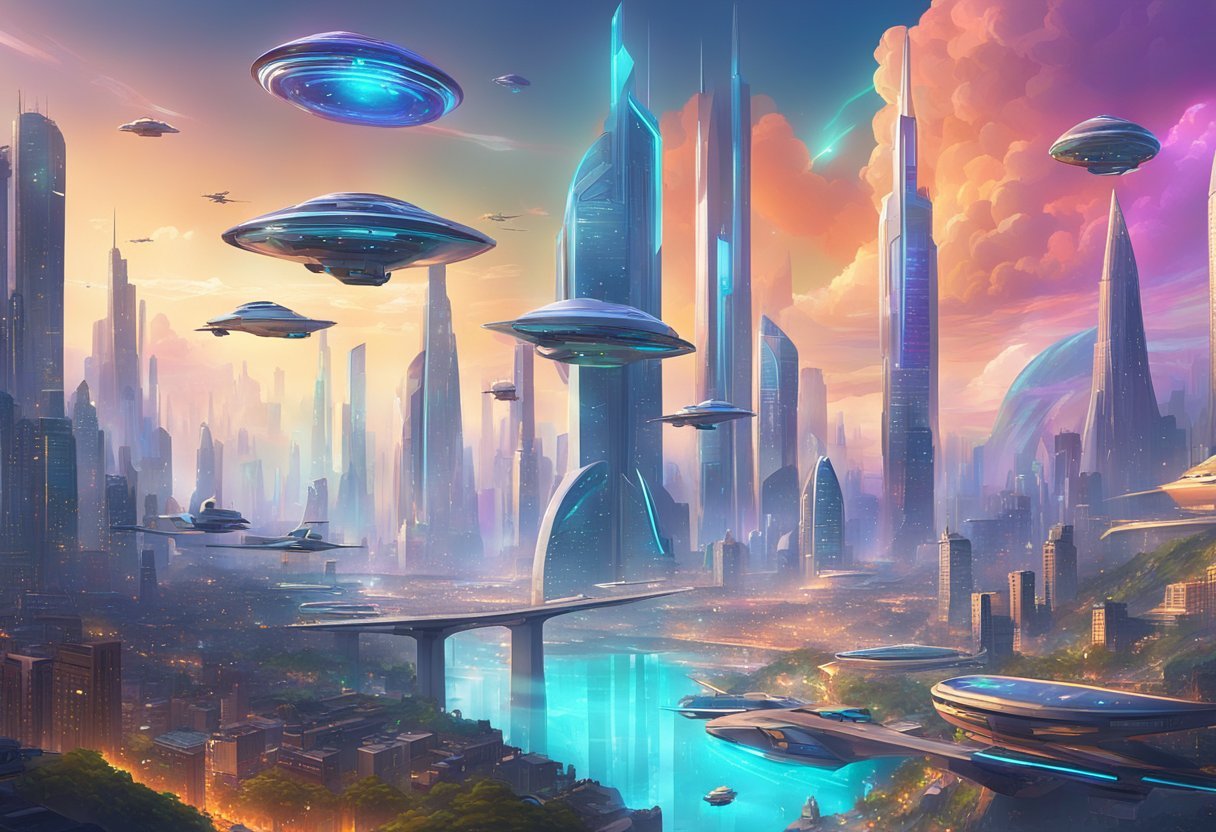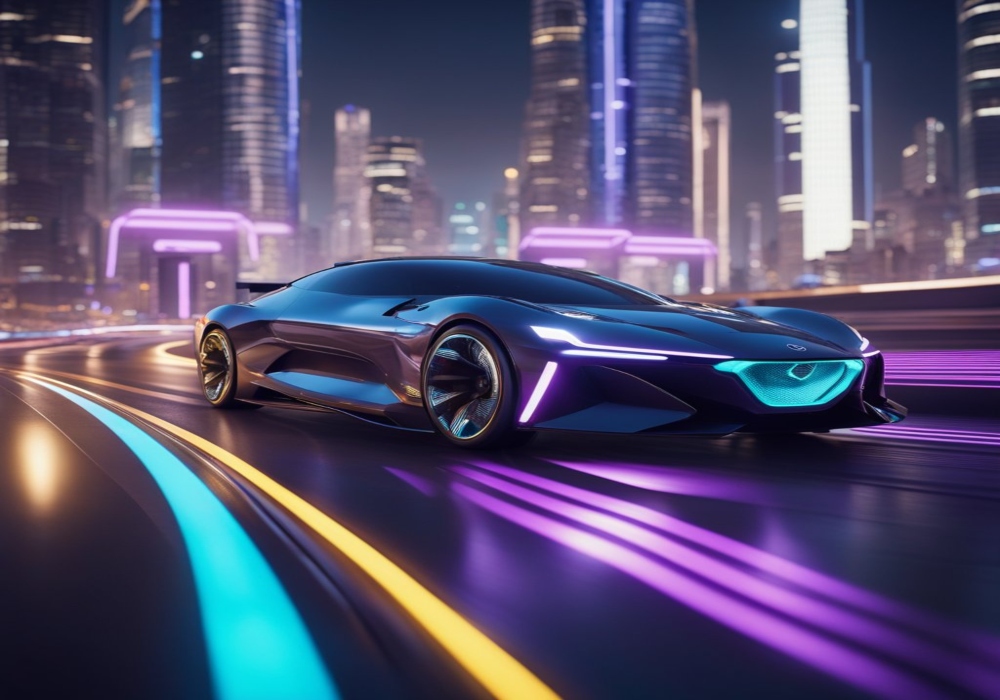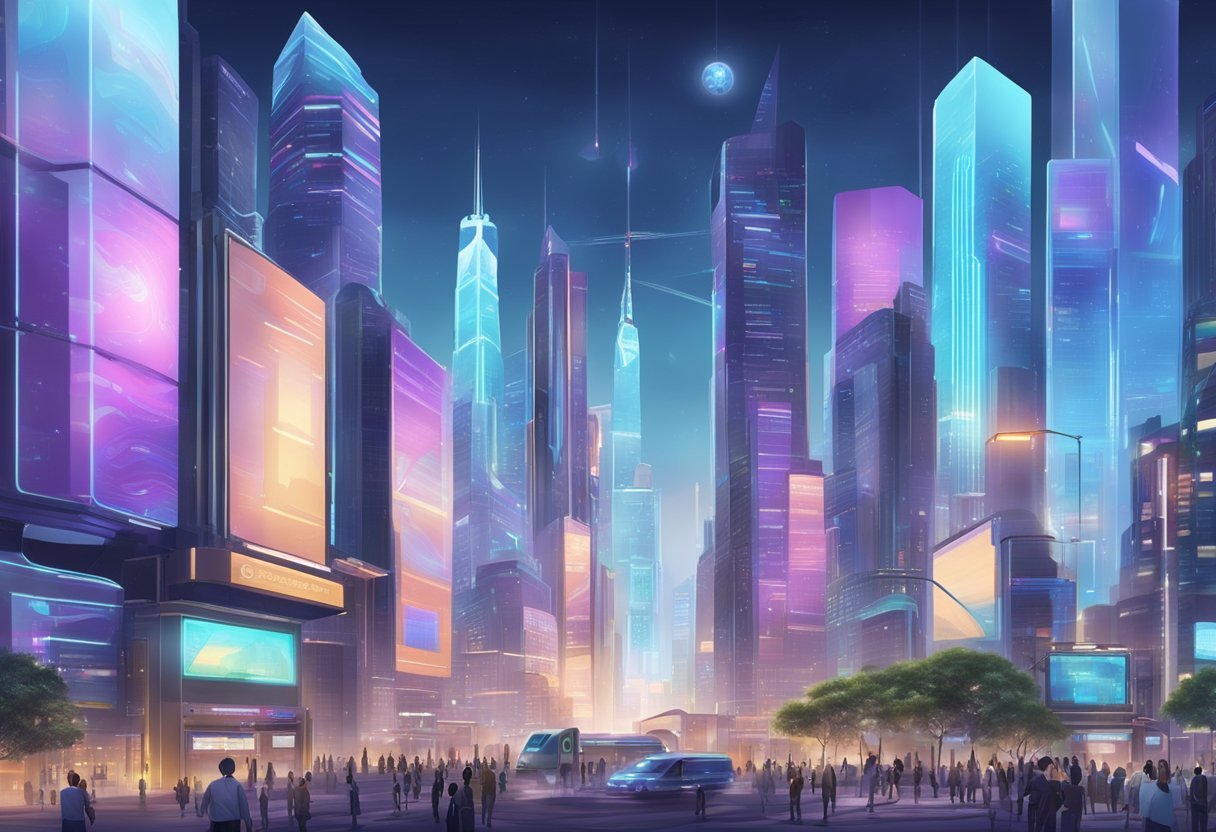Unreal Engine 5 has been a game-changer in the world of gaming, movies, and the metaverse. The Unreal Engine 5 has the potential to create a virtual world that is as realistic as the real world. With the release of The Matrix Awakens: An Unreal Engine 5 Experience, Epic has shown that the Unreal Engine 5 can deliver a virtual world that runs in real-time on modern home consoles and PCs.
The Unreal Engine 5 is a powerful tool for creating immersive experiences in the metaverse. It allows developers to create virtual worlds that are more realistic than ever before. With its advanced graphics capabilities and real-time rendering technology, the Unreal Engine 5 is the perfect tool for creating immersive experiences in the metaverse. Developers can create virtual worlds that are as realistic as the real world, allowing users to immerse themselves in a completely new and exciting experience. The Unreal Engine 5 has the potential to revolutionize the way we experience the metaverse, and it is an exciting time for developers and users alike.
Overview of Unreal Engine 5
Unreal Engine 5 is a game engine developed by Epic Games. It is designed to provide developers with the tools they need to create high-quality games, as well as virtual and augmented reality experiences. UE5 is a powerful tool that offers a wide range of features and advancements that make it stand out from other game engines.
Core Features of UE5
UE5 has a wide range of core features that make it a popular choice for game developers. One of the most notable features is its scalability. This means that developers can create games that are optimized for a range of different platforms, from mobile devices to high-end gaming consoles. UE5 also offers a range of optimization tools, which can help developers to create games that run smoothly on a range of devices.
Another key feature of UE5 is its AI capabilities. The engine includes a range of AI tools that can be used to create intelligent and responsive game characters. This can help to create more immersive game experiences, as well as more challenging gameplay.
Advancements in UE5 Technology
UE5 includes a range of advancements in technology that make it a powerful tool for game developers. One of the most notable advancements is the introduction of Lumen, a real-time global illumination system. This allows developers to create more realistic lighting effects in their games, which can help to create a more immersive experience for players.
UE5 also includes Nanite, a new virtualized geometry system that allows developers to create highly detailed game environments. This can help to create more realistic game worlds, as well as more immersive gameplay experiences.
Comparison with Other Game Engines
UE5 is one of the most advanced game engines available today. It offers a range of features and advancements that make it stand out from other game engines, including Unity and CryEngine. UE5’s scalability and optimization tools make it a popular choice for developers who want to create games that run smoothly on a range of different platforms. UE5’s AI capabilities and advancements in technology, such as Lumen and Nanite, make it a powerful tool for creating immersive and engaging game experiences.
Metaverse Fundamentals
Defining the Metaverse
The concept of the Metaverse is a virtual universe that includes a collection of interconnected virtual worlds. It is a shared space where people can interact with each other in a virtual environment.
The Metaverse is a platform that allows people to engage in various activities such as gaming, socializing, education, and commerce. The Metaverse is still in its early stages of development, but it has the potential to revolutionize the way we interact with each other and the digital world.
Role of Game Engines in Metaverse Development
Game engines play a vital role in Metaverse development. Unreal Engine 5 is one of the most popular game engines that is being used to develop the Metaverse. The functionality of this engine allows developers to create immersive virtual worlds with high-quality graphics.
The engine provides a wide range of tools that help developers in world building, character creation, and animation. The Metaverse is a complex platform that requires a lot of resources, and game engines like Unreal Engine 5 provide the necessary tools to create and maintain the platform.
The Metaverse is a concept that has the potential to revolutionize the way we interact with each other and the digital world. Game engines like Unreal Engine 5 play a vital role in Metaverse development by providing the necessary tools to create immersive virtual worlds. The Metaverse is still in its early stages of development, but it has the potential to become a significant platform that can change the way we live our lives.
Unreal Engine 5 and Metaverse Development
Unreal Engine 5 is a powerful tool for creating immersive experiences, including those in the metaverse. With its advanced features and capabilities, developers can create stunning VR experiences that transport users to new worlds.
Building Immersive Experiences
Unreal Engine 5 offers a variety of tools for creating immersive experiences, including advanced lighting and rendering features. These tools allow developers to create realistic environments that are both visually stunning and highly interactive.
Metahuman and Character Design
One of the most exciting features of Unreal Engine 5 is its Metahuman Creator. This tool allows developers to create highly realistic characters with lifelike facial expressions and movements. This is essential for creating compelling experiences in the metaverse, where users expect a high level of realism and immersion.
World Partition and Open Worlds
Unreal Engine 5’s World Partition system allows developers to create massive open worlds with seamless transitions between different areas. This is essential for creating immersive experiences in the metaverse, where users expect to be able to explore vast virtual worlds.
Unreal Engine 5 is an essential tool for metaverse development, offering advanced features and capabilities for creating immersive experiences. With its Metahuman Creator, advanced lighting and rendering features, and World Partition system, developers can create stunning VR experiences that transport users to new worlds.
Epic Games and the Metaverse Ecosystem

Fortnite’s Influence
Epic Games’ flagship game, Fortnite, has been a driving force behind the company’s push towards the metaverse. Since its release in 2017, Fortnite has evolved from a simple battle royale game into a multifaceted platform for social entertainment.
With over 350 million registered players, Fortnite has become a cultural phenomenon and a hub for virtual events and concerts. The game’s success has given Epic Games the resources and influence to shape the future of the metaverse.
Epic’s Marketplace and Community Support
Epic Games has also been investing heavily in building a robust metaverse ecosystem through its marketplace and community support. The company’s Unreal Engine 5 provides developers with the tools and resources to create immersive virtual experiences.
Epic Games has acquired Quixel Bridge and Megascans, which provide developers with a vast library of high-quality assets to use in their projects. The company has also launched a Creator Fund, which provides financial support to creators building projects on the Unreal Engine.
Strategic Partnerships and Collaborations
Epic Games has also formed strategic partnerships and collaborations to further develop the metaverse ecosystem. The Matrix Awakens: An Unreal Engine 5 Experience, a collaboration between Epic Games and Warner Bros.
Interactive Entertainment, showcases the potential of the Unreal Engine 5 in creating realistic virtual environments. The company has also partnered with major brands such as Nike, Marvel, and Travis Scott to create virtual experiences within Fortnite. Epic Games‘ ecosystem approach to the metaverse is helping to shape the future of virtual experiences.
Epic Games is at the forefront of the metaverse revolution and is actively working to build a robust ecosystem to support it. Through Fortnite’s success, the company has the influence to shape the future of the metaverse. Its marketplace and community support, as well as strategic partnerships and collaborations, are helping to develop a vibrant metaverse ecosystem.
Emerging Technologies and Trends
AR/VR Integration
The integration of Augmented Reality (AR) and Virtual Reality (VR) technologies is revolutionizing the way we interact with the world around us. With the release of Unreal Engine 5, the metaverse is becoming more immersive than ever before. The integration of AR and VR technologies is creating an entirely new level of interactivity and engagement, allowing users to experience the metaverse in a more realistic and engaging way.
Blockchain and the Metaverse
Blockchain technology is becoming increasingly important in the world of gaming and entertainment. With the rise of NFTs (Non-Fungible Tokens), blockchain technology is being used to create unique and valuable digital assets that can be bought, sold, and traded. In the metaverse, blockchain technology is being used to create unique digital identities, allowing users to own and control their digital assets. This technology is also being used to create decentralized marketplaces, where users can buy and sell digital assets without the need for a central authority.
The Future of Gaming and Entertainment
The release of the PlayStation 5 and Xbox Series X has ushered in a new era of premium consoles, with cutting-edge hardware and software that allows for more immersive and realistic gaming experiences. Mobile devices are also becoming more powerful, with the ability to run high-quality games and applications. The metaverse is set to become the next frontier of gaming and entertainment, with the potential to create entirely new forms of interactive and engaging experiences for users. With the release of Unreal Engine 5, the future of gaming and entertainment is looking brighter than ever before.
Optimization and Accessibility
Performance on Various Platforms
Unreal Engine 5 is known for its scalability and optimization, which makes it a great choice for developers looking to create metaverse experiences that can run smoothly on various platforms. The engine’s advanced rendering capabilities allow for stunningly lifelike visuals, while its scalability ensures that the experience can run smoothly on both high-end and low-end devices.
According to Nick Penwarden, Vice President of Engineering at Epic Games, Unreal Engine 5 is designed to support a wide range of platforms, including mobile devices. This means that developers can create metaverse experiences that can be accessed by a large audience, regardless of the device they are using.
Accessibility for Developers and Creators
Unreal Engine 5 also offers accessibility features that make it easier for developers and creators to create metaverse experiences. One of the most notable features is the Blueprint visual scripting system, which allows developers to create complex logic and gameplay mechanics without having to write a single line of code.
Anshel Sag, a tech industry analyst at Moor Insights & Strategy, notes that the Blueprint system is a game-changer for developers who may not have a background in programming. This feature allows them to create complex gameplay mechanics and logic without having to learn a new programming language.
Unreal Engine 5 offers a range of accessibility features that make it easier for developers and creators to create accessible metaverse experiences. For example, the engine offers support for text-to-speech and closed captioning, which makes it easier for users with hearing or visual impairments to access the experience.
Unreal Engine 5 is a powerful tool for creating metaverse experiences that are scalable, optimized, and accessible. Its advanced rendering capabilities, scalability, and accessibility features make it a great choice for developers and creators looking to create immersive and accessible metaverse experiences.
Frequently Asked Questions
What are the advantages of using Unreal Engine 5 for metaverse development?
Unreal Engine 5 offers several advantages for metaverse development. Its advanced rendering capabilities enable the creation of stunningly lifelike visuals, which are essential for establishing a sense of presence and immersion within the metaverse.
Unreal Engine 5 offers robust networking features that make it easy to create large-scale, persistent virtual worlds that can support thousands of concurrent users. Finally, Unreal Engine 5’s Blueprint visual scripting system allows developers to rapidly prototype and iterate on their metaverse experiences without needing to write code.
How does Unreal Engine 5’s licensing model work for creating metaverse experiences?
Unreal Engine 5 uses a royalty-based licensing model for metaverse experiences. Developers pay a 5% royalty on gross revenue after the first $1 million earned per product, per quarter. This means that developers can use Unreal Engine 5 to create metaverse experiences without paying any upfront fees, and only need to pay royalties once their product starts generating significant revenue.
What are the key features of Unreal Engine 5 that make it suitable for building immersive metaverse worlds?
Unreal Engine 5’s key features for building immersive metaverse worlds include its advanced rendering capabilities, robust networking features, and Blueprint visual scripting system. Unreal Engine 5 offers support for next-generation hardware, including the PlayStation 5 and Xbox Series X, which enables developers to create experiences that take full advantage of the latest hardware capabilities.
How does Unreal Engine 5 compare to Unity in terms of metaverse development capabilities?
Unreal Engine 5 and Unity are both powerful engines for metaverse development, and each has its own strengths and weaknesses. Unreal Engine 5’s advanced rendering capabilities and robust networking features make it well-suited for building large-scale, immersive virtual worlds.
Unity, on the other hand, offers a more flexible and customizable development experience, and is often preferred by developers who want to create more experimental or unconventional metaverse experiences.
Can developers migrate projects from Unreal Engine 4 to 5 for metaverse applications?
Yes, developers can migrate projects from Unreal Engine 4 to Unreal Engine 5 for metaverse applications. Unreal Engine 5 is designed to be backward-compatible with Unreal Engine 4, which means that developers can easily import their existing projects and assets into the new engine. However, some features and workflows may need to be updated to take advantage of Unreal Engine 5’s new capabilities.
What support does Epic Games offer for developers working on metaverse projects in Unreal Engine 5?
Epic Games offers extensive support for developers working on metaverse projects in Unreal Engine 5. This includes a comprehensive documentation library, community forums, and direct support from Epic Games’ own development team.
Epic Games offers a range of tools and services that are designed to help developers create and distribute their metaverse experiences, including the Unreal Marketplace, which offers a wide range of assets and plugins for Unreal Engine 5.




